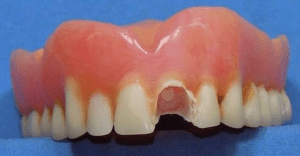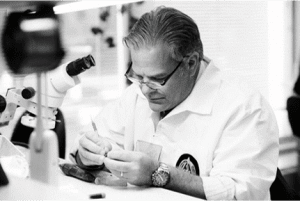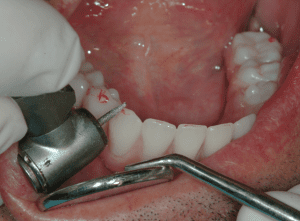By Tony Prestipino, CDT
Do denture wearers still need to see their dentist twice a year for hygiene? The quick answer is yes, and here’s why. We all know when we go to the dentist for our bi-annual teeth cleaning that it is for our oral health. Oral health is much more, however, than just a hygienist cleaning teeth. For dentate patients (people who have teeth), the hygienist will clean the teeth, often take x-rays, check to make sure the bite is in its correct functional orientation, check for oral diseases, and evaluate for any anomalies that may be present in the mouth. These are all very important so the dentist can detect oral diseases and cavities before they get out of hand. It is different when a denture patient sees their dentist for their check-up. Since denture wearers do not have any teeth, they won’t get more cavities, however, the dentist still needs to check for any oral disease and a correctly functioning bite. There are two types of denture patients. The ones who have no teeth and are wearing a denture, and the ones who have implants supporting a denture. Even though denture patients have no teeth connected to their bone, their oral cavity will be evaluated and checked to make sure that the upper and lower jaws come together correctly, and that their teeth hit each other in the correct way. When denture teeth hit each other, they ultimately wear down quickly because they are not as hard as the enamel of a natural tooth. When a person who wears a denture chews, clinches, and/or grinds, the back teeth wear down, and when the back teeth wear down, the front teeth hit. This is not normal and usually results in a broken denture or a broken tooth off of the denture. (ex.#1 and #2).

At a hygiene appointment, the dentist looks to see if the teeth hit correctly. If the dentist notices that the front teeth are hitting before the back teeth because the back teeth have worn down, they will adjust the denture to achieve a proper bite. If patients do not regularly see the dentist, their denture will not last as long and is much more likely to fracture or break. Also, because the denture wearer does not have teeth, the bone that holds those teeth no longer gets stimulated, causing the bone to recede over time. The more the bone recedes with age, the looser the denture fits. The dentist can easily re-align a denture by adding material to make it fit better. When patients lose too much bone, the denture will no longer fit as well as the day it was made because there is not enough bone to properly hold it. There are solutions out in the market for these issues, like Poligrip denture adhesive. For the denture wearer who has dental implants helping retain their dentures in the mouth, there are things that the dentist needs to look at during their hygiene appointment as well. They will be checking the bite to make sure that the back teeth have not worn down, leading the front teeth to hit too hard and causing a potential fracture or a break. They will also check to see how the patient cleans the areas surrounding the dental implants to make sure that they are being cleaned properly, in order to avoid an infection or disease that could cause the implant to fail.
An important note that differentiates a person who wears a denture and a person with dental implants who wears a denture, is that the bone no longer recedes because the dental implants act as the tooth that was originally in the bone. This means the bone will not recede, which causes a loose-fitting denture.
Many patients do not realize there are facilities that create most of the dental restorations a patient receives. (ex. #3)

These facilities are known as dental laboratories. Dental laboratories have trained and certified technicians fabricating dental prosthetics. Dental laboratories create such things as crowns, bridges, dentures, and implant restorations. These restorations usually take the dental laboratory two to four weeks to make. They are made from a multitude of materials, depending on the dental restoration. As the patient, you have the right to ask your dentist what materials your restoration is being made from, if the restoration is made in the United States, and if the laboratory they use is certified. It would probably surprise you how little regulation there is in the dental field when it comes to these matters. Most patients do not know where their teeth are made, who is making their teeth, what materials the teeth are made of, if the restoration is made from FDA-approved materials, and if implants, are the implants made with the original manufacturer parts. These are all questions patients have the right to ask their dentist before the dentist decides which laboratory to send to. So yes, it is very important denture wearers maintain their hygiene appointments. As Mr. Bennett Napier said in an earlier post, “it is important that the patient take an active role in their oral health care to ensure their best possible outcomes.”
References https://www.ada.org/resources/research/science-and-research-institute/oral-health-topics/dentures
About the Author
 Tony Prestipino, CDT completed the Dental Technology program at Northern Virginia College and received additional, specialized training from the Pankey Institute. He is a member of the National Association of Dental Laboratories, the Academy of Osseointegration, the Northern Virginia Implant Society and the Northern Virginia Dental Society. Mr. Prestipino is a patent holder, published author and lectures throughout the country on implant dentistry. He has provided student and staff support at the University of Maryland. Mr. Prestipino is the President of Artifex Dental Laboratory located outside of Washington, DC.
Tony Prestipino, CDT completed the Dental Technology program at Northern Virginia College and received additional, specialized training from the Pankey Institute. He is a member of the National Association of Dental Laboratories, the Academy of Osseointegration, the Northern Virginia Implant Society and the Northern Virginia Dental Society. Mr. Prestipino is a patent holder, published author and lectures throughout the country on implant dentistry. He has provided student and staff support at the University of Maryland. Mr. Prestipino is the President of Artifex Dental Laboratory located outside of Washington, DC.









Many people think that once they get dentures, they no longer have to see the dentist. However, this is not the case. Denture wearers still need to see their dentist twice a year for hygiene appointments. Is it important to keep up with these appointments because your dentures can cause problems if they are not cleaned properly?
Yes I do agree. Denture must be cleaned properly. Seeing a dentist twice a year is enough to avoid any unexpectedly problem in your denture.
Thanks for this content. I am a denture wearers. This is really helpful in my end. Thanks!
Our dental health can be adversely affected by not maintaining proper hygiene when wearing dentures. I appreciate you sharing this useful information with us.
Yes, definitely it’s true. Denture-wearers should visit the dentist every year for hygiene. Thanks for sharing. If you are from Calgary Canada you can reach the best dentist in Calgary at McKnight Square Dental. Call: (403) 407 1958
This is absolutely right. Everybody should visit the dentist every year. Thanks for sharing this information with us.
This article provides valuable insights into the ongoing oral health maintenance for denture wearers, emphasizing the continued importance of regular dental check-ups. The explanation of how denture-wearing individuals are still susceptible to oral health issues and the need for professional hygiene assessments is enlightening.
The emphasis on regular dental check-ups, despite not having natural teeth, highlights the importance of monitoring overall oral health, including the condition of the dentures and the health of the supporting tissues. As someone interested in comprehensive dental care, I’m curious about specific maintenance tips for denture wearers between these biannual appointments. Could you share some practical at-home care recommendations to ensure the longevity and comfort of dentures? Understanding the balance between professional check-ups and personal care routines would be beneficial for those navigating denture maintenance.
As someone interested in the specifics of denture maintenance, I’m curious to know if the article provides additional insights into any specialized care routines or products recommended for denture wearers in between their biannual dental visits. Understanding these practical tips could be beneficial for individuals seeking to ensure the longevity and comfort of their dentures.
The insight into potential issues like gum health, changes in the mouth’s anatomy, and the importance of professional cleanings for denture wearers is valuable information. It serves as a reminder that even though dentures replace natural teeth, dental care remains an essential aspect of overall oral health. For denture wearers, how has regular dental check-ups benefited you, and have you encountered any unexpected issues that were addressed during these visits?
The author convincingly emphasizes the importance of continued dental visits for denture wearers, citing reasons beyond natural teeth, such as the examination of the oral tissues, fit, and condition of the dentures. I appreciate the practical advice offered regarding maintaining optimal oral hygiene even with dentures, reinforcing the idea that denture wearers should remain proactive in caring for their overall oral health. The article serves as a valuable resource, dispelling misconceptions and guiding denture wearers toward a comprehensive approach to oral care that includes regular professional oversight.
This article really drives home the point about why denture wearers shouldn’t skip those bi-annual dental check-ups. It’s not just about teeth cleaning; the dentist plays a crucial role in ensuring the overall health of the oral cavity, even for those without natural teeth. I appreciate how it breaks down the differences between traditional denture wearers and those with implants, shedding light on issues like bone recession and the impact on denture fit. The part about dental laboratories is eye-opening, making me realize there’s a lot patients should know about where their dental restorations come from. It’s a reminder that our oral health is a collaborative effort, and being proactive in asking questions can lead to better outcomes, just as Mr. Bennett Napier mentioned.
Great article! It provides a comprehensive understanding of why denture wearers still need regular dental check-ups for optimal oral health. The explanation about the importance of maintaining a proper bite, especially for denture patients, is enlightening. I appreciate the emphasis on the role of dental laboratories and the patient’s right to inquire about the materials used in their dental restorations. Can you share more insights into the specific materials commonly used and the potential impact on long-term oral health?
Your article provides a comprehensive understanding of why denture wearers should continue with their bi-annual dental check-ups. The insights into maintaining proper bite alignment, preventing denture wear, and addressing potential issues are valuable. Could you elaborate on the role of dental laboratories in creating dental prosthetics and what patients should inquire about the materials used in their restorations?
Maintaining regular dental check-ups is crucial for denture wearers, even though they may not have natural teeth. As the article highlights, dentists play a vital role in assessing denture function, preventing fractures, and addressing potential issues. Have you ever considered the specific materials and processes involved in creating your dental restorations? It might be worth discussing with your dentist to ensure the best possible outcomes for your oral health.
Yes, denture wearers should still see their dentist twice a year. Regular visits help ensure proper fit, check for oral diseases, and maintain overall oral health. Dentists adjust dentures to prevent wear and tear, check for bone recession, and inspect implants if present. These appointments help prolong denture lifespan and prevent complications, ensuring a healthy mouth and comfortable fit.
For denture wearers, regular dental check-ups every six months are still essential. Even without natural teeth, dentists ensure your dentures fit well, check for oral diseases, and assess your bite alignment. This proactive care helps prevent issues like worn-down dentures, ensuring your oral health remains optimal and your dentures functional.
For denture wearers, seeing the dentist twice a year is crucial for oral health maintenance, despite not having natural teeth. Regular check-ups ensure the denture fits well, assess oral tissues for any diseases, and verify correct jaw alignment. This preventive care helps avoid complications like denture damage from improper bite alignment over time.
Do denture wearers still need to see their dentist twice a year for hygiene? Yes, they do. Regular visits are crucial for checking oral health, even without natural teeth. Dentists evaluate for oral diseases, ensure a correct bite, and inspect for any abnormalities. Denture wearers, including those with implants, need these check-ups to prevent issues like worn-down teeth, which can lead to broken dentures. Regular dental visits help maintain overall oral health and functionality.